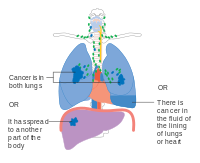
In Advanced Science journal, an important research study was published recently. Researchers at the University of California in San Diego made use of a plant virus to prevent metastatic cancer of lungs. This virus was found in plants of black-eyed peas. The growth of tumors was suppressed by treating the lungs with mice, who were suffering from metastatic cancer in breast tissue. Moreover, the plant virus also prevented the spread of this cancer to the lungs of mice afflicted with disease. Lung cancer is not just the most common metastatic cancer, it is also very dangerous and difficult to cure.
At the University of California in San Diego, researchers performed a successful experiment to control the metastatic form of lung cancer. Cowpea mosaic virus is a plant virus that they developed into the form of a body injection. Although the virus does not cause any harm to humans and animals, it is still considered as a foreign body that invades the host. Consequently, it triggers an effective immune response to fight cancer in the body of the patient.
The patient’s immune system is boosted by the plant virus as it tries to identify and destroy cancer cells, which are attacking the lungs. The virus does not cause any infection in the patient’s body. At the same time, the immune cells are alarmed and they go to search and attack the incoming pathogen. To elicit such an immune response from lung tumors, researchers synthesized nanoparticles from cowpea mosaic virus. These nanoparticles effectively attacked proteins in the lungs.
The infection in the lungs was fought back by immune cells, which secreted and expressed the protein S100A9. Researchers decided to target this protein because the growth and spread of tumors was triggered by an overexpression of the protein S100A9. They used nanoparticles to target the metastasis in the lung, thereby making their novel immunotherapy successful. The nanoparticles bind with immune cells that attack tumor cells in the lungs.
The microenvironment of tumor cells in the lungs is changed by localized nanoparticles, which effectively destroy not just well defined tumors but also prevent the growth of future tumors. Researchers synthesized nanoparticles by infecting black-eyed pea plants with cowpea mosaic virus in the lab. The harvested virus appeared in the form of spherical shaped nanoparticles. The target protein molecules S100A9 were then attached to the surface of nanoparticles. The study was successful in both the prevention and treatment of metastatic lung cancer.
